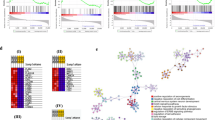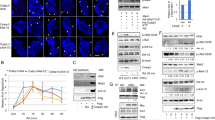Abstract
Cytochrome P450-dependent oxidation is a pathway for all-trans-retinoic acid (all-trans-RA) catabolism. Induction of this catabolic pathway was studied in MCF-7 breast cancer cells. MCF-7 cells showed low constitutive all-trans-RA catabolism. Concentration-dependent induction was obtained by preincubation of the cells with all-trans-RA (10(-9) to 10(-6) M). Onset of induction was fast, being detectable within 60 min, with maximal induction (45-fold) obtained after 16 h. Enzymatic characterization of induced all-trans-RA catabolism showed an estimated Km value (Michaelis-Menten constant) of 0.33 microM and a Vmax value (maximal velocity of an enzyme-catalysed reaction) of 54.5 fmol polar all-trans-RA metabolites 10(6) cells(-1) h(-1). These kinetic parameters represent the overall formation of polar metabolites from all-trans-RA. Induction of all-trans-RA catabolism was also obtained with other retinoids, CH55 >> 13-cis-RA = all-trans-RA > 9-cis-RA > 4-keto-all-trans-RA > 4-keto-13-cis-RA > retinol. The potency of the retinoids to induce all-trans-RA catabolism was correlated to their retinoic acid receptor affinity (Crettaz et al, 1990; Repa et al, 1990; Sani et al, 1990). Induction of all-trans-RA catabolism was inhibited by actinomycin D. Furthermore, all-trans-RA did not increase cytosolic retinoic acid-binding protein (CRABP) mRNA levels. These data suggest that induction of all-trans-RA catabolism in MCF-7 cells is a retinoic acid receptor-mediated gene transcriptional event. Induced all-trans-RA catabolism was inhibited by various retinoids with decreasing potency in the order: all-trans-RA > 4-keto-all-trans-RA > 13-cis-RA > 9-cis-RA > 4-keto-13-cis-RA > retinol > CH55. The antitumoral compound liarozole-fumarate inhibited all-trans-RA catabolism with a potency similar to that of all-trans-RA.
This is a preview of subscription content, access via your institution
Access options
Subscribe to this journal
Receive 24 print issues and online access
$259.00 per year
only $10.79 per issue
Buy this article
- Purchase on Springer Link
- Instant access to full article PDF
Prices may be subject to local taxes which are calculated during checkout
Similar content being viewed by others
Author information
Authors and Affiliations
Rights and permissions
About this article
Cite this article
Krekels, M., Verhoeven, A., van Dun, J. et al. Induction of the oxidative catabolism of retinoic acid in MCF-7 cells. Br J Cancer 75, 1098–1104 (1997). https://doi.org/10.1038/bjc.1997.190
Issue Date:
DOI: https://doi.org/10.1038/bjc.1997.190
This article is cited by
-
Inhibition of all-TRANS-retinoic acid metabolism by R116010 induces antitumour activity
British Journal of Cancer (2002)



